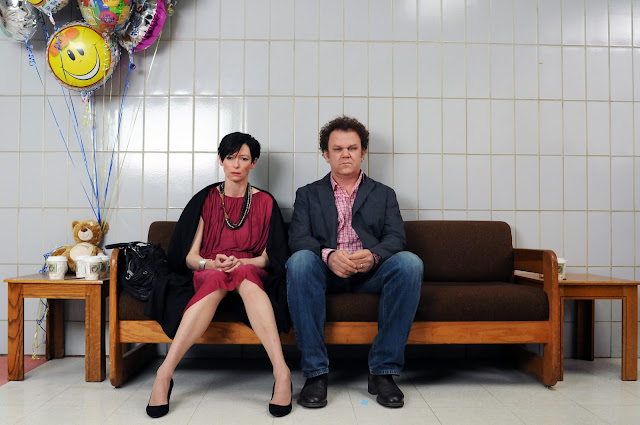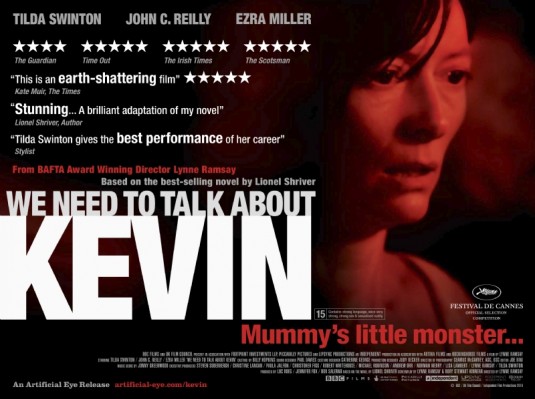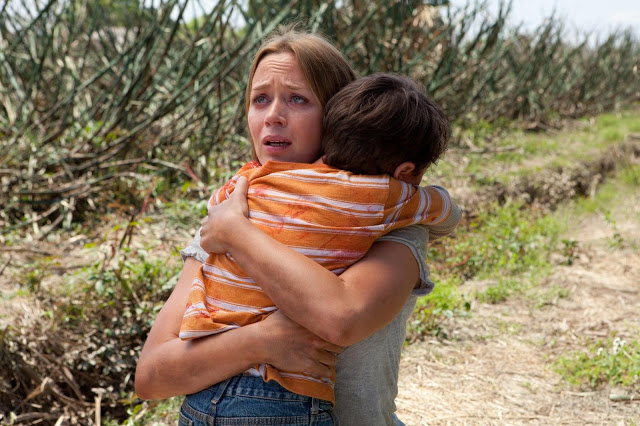 |
| Official movie poster for We Need to Talk About Kevin |
The reason for this (apart from the obvious fact that it’s about a child psychopath that you know is going to do something very, very bad, thus every event, every word is soaked in a weighty, dull dread) is that if you are a woman who is ambivalent about having children, Kevin represents your absolute worst nightmare, the zero sum of all your fears of what could happen once you’ve heaved a child from your bloody body.
 |
| Tilda Swinton and John C. Reilly in We Need to Talk About Kevin |
It’s a fascinating and minutely detailed account from Eva Katchadourian of her mothering of Kevin. It’s also an examination of her own soul and an attempt to parse what she may and may not be responsible for during the long build up to the ultimate flowering of Kevin’s violence.
Eva is a very cerebral person, and accordingly Kevin is a very cerebral book, following Eva’s long monologue (confession?) to her absent husband as she makes a hard and painful analysis of what has happened. In a wider sense, it is also an examination of the cultural notion of a mother’s guilt for the actions of her children—Eva is punished by her community for the crimes of her son and ends up living almost as a fugitive from her old life. She is wracked by guilt and horror, analysing events and their lead-up with painful clarity.
But it is soon very clear that though Eva is aware very early on that something is “wrong” with Kevin, she is isolated both by Kevin’s insidious nature and her very role as a mother—and is utterly powerless to do anything about it. Her All-American, trad values-craving husband Franklin coerces her into moving away from her beloved New York to an extravagantly ugly house in the suburbs for the sake of their “family.” Every time she tries to raise her concerns about Kevin, he is disbelieving, and disapproving—he is easily manipulated by his savvy child; because he is not Kevin’s primary caregiver, he only sees what Kevin wants him to see. On top of this, he is a devotee at the shrine of the inviolable nuclear family and refuses to acknowledge anything that could endanger this dream. Instead, he equates Eva’s misgivings with what he perceives as her untrustworthy wanderlust which he fears will take her away from him.
 |
| Tilda Swinton glaring |
And yet, in a lot of ways Eva and Kevin are very alike. This is why Kevin knows it’s easier to get around Dad, but not around Mum—because she understands him in a way Dad never can. Kevin embodies the darker elements of Eva that she herself is unaware of until she starts her minute analysis in the aftermath of his arrest. This feeds her sense of guilt—but also her understanding of him, and her eventual coming to terms with his nature.
Shriver has obviously done her homework. Her construction of Kevin’s childhood reminded me very much of undiagnosed schizophrenic Nancy Spungen’s in her mother’s memoir And I Don’t Want to Live This Life. And when I read this NY Times article about child psychopaths, I thought right away of Kevin and how much the behaviour of the children in it echoed his. It also made me think of Lionel Dahmer’s memoir and how he searched for the answer to Jeffrey’s crimes in his parenting, the dark twists in his own personality and the ways in which he and his son were alike.
 |
| Tilda Swinton looking uneasy |
We Need to Talk About Kevin is a dark and disturbing, dread-filled book. It consumed my thoughts while I was reading it and terrorised my brain. There are imperfections that mar its surface, the main one being some narrative trickery that I won’t reveal as it’s something of a spoiler. But I will say that I thought it was a bit gimmicky and a slight betrayal of the reader.
So when I heard there was a film coming out, I thought, “Crikey! Good luck!”
This is because, as with The Hunger Games, We Need to Talk About Kevin is narrated as an internal monologue. Recreating the same effect in a film is very difficult, if not impossible, to do. But the distinctive voice of Eva Katchadourian is essential to the story, is the story.
However, there was one very positive factor—the film was directed by Lynne Ramsay, who is absolutely fantastic. Her films are always creative, individual, and beautifully made.
 |
| Tilda Swinton and tomato soup |
But hearing about the casting of Tilda Swinton gave me some pause. Don’t get me wrong—I love me some SWINTON. She is astonishingly awesome. I also really liked her interview with W Magazine about the film, in which she said:
It’s every pregnant woman’s nightmare to give birth to the devil. And every mother worries that she won’t connect to her children. When I had my children, my manager asked me what project I wanted to work on next. I said, “Something Greek, perhaps Medea.” Nobody quite understood what I meant, what I was feeling…
You have twins, who are now 13. Did you worry about becoming a mother?
When I first saw the twins, I really liked them. And, at the same time, there was a ghost over my shoulder saying, What if I hadn’t liked them? Kevin spoke to that feeling. It is that nightmare scenario: What if you don’t feel that connection to your children? There’s no preparation for having children. In Kevin, the woman I play is in mourning for her past life, and yet she looks at this dark, nihilistic kid and knows exactly where he comes from. He isn’t foreign to her; she sees herself. And that is, quite literally, revolting to her.
And of course, she is fantastic in the film. She is such a great actress, so lacking in vanity and unafraid to plunge into whatever is needed for a role. It’s just, that … well, Eva is of Armenian descent. And this is quite important in the books. She’s olivey and dark, and Swinton is a long cool glass of milk.
 |
| Tilda Swinton and John C. Reilly and balloons in We Need to Talk About Kevin |
This might have been okay, if I didn’t feel so uneasy about the casting of the other central characters as well. John C. Reilly, I love you, so please forgive me for this, but I imagined Franklin as handsome (I think he’s actually described as such in the book)—albeit in a ruddy, slightly chunky sort of way, but handsome nonetheless. Not only did Reilly not at all correspond with how I thought Franklin should look, but I just completely could not buy he and Swinton as a couple, no matter how hard I tried. He didn’t do a bad job, but I just did not believe it. And there wasn’t a lot of chemistry between them to help the situation out, either.
And then we arrive at the titular Kevin himself. With Kevin, I had the opposite problem: he is described as being quite good-looking in the books. But movie-Kevin goes beyond this; he looks like an underwear model. Ladies and gentlemen I present to you, Ezra Miller:
 |
| Ezra Miller, star of We Need to Talk About Kevin |
However, it’s impossible to overcome the central problem—the way the story is told in the book just can’t be replicated in a film. But I also found that having read the book, there was just no tension in the story and the characters didn’t quite gel enough for me to get pulled into their story anyway. It’s a well-made film, but I’ll have to declare the winner unequivocally: BOOK.
———-


